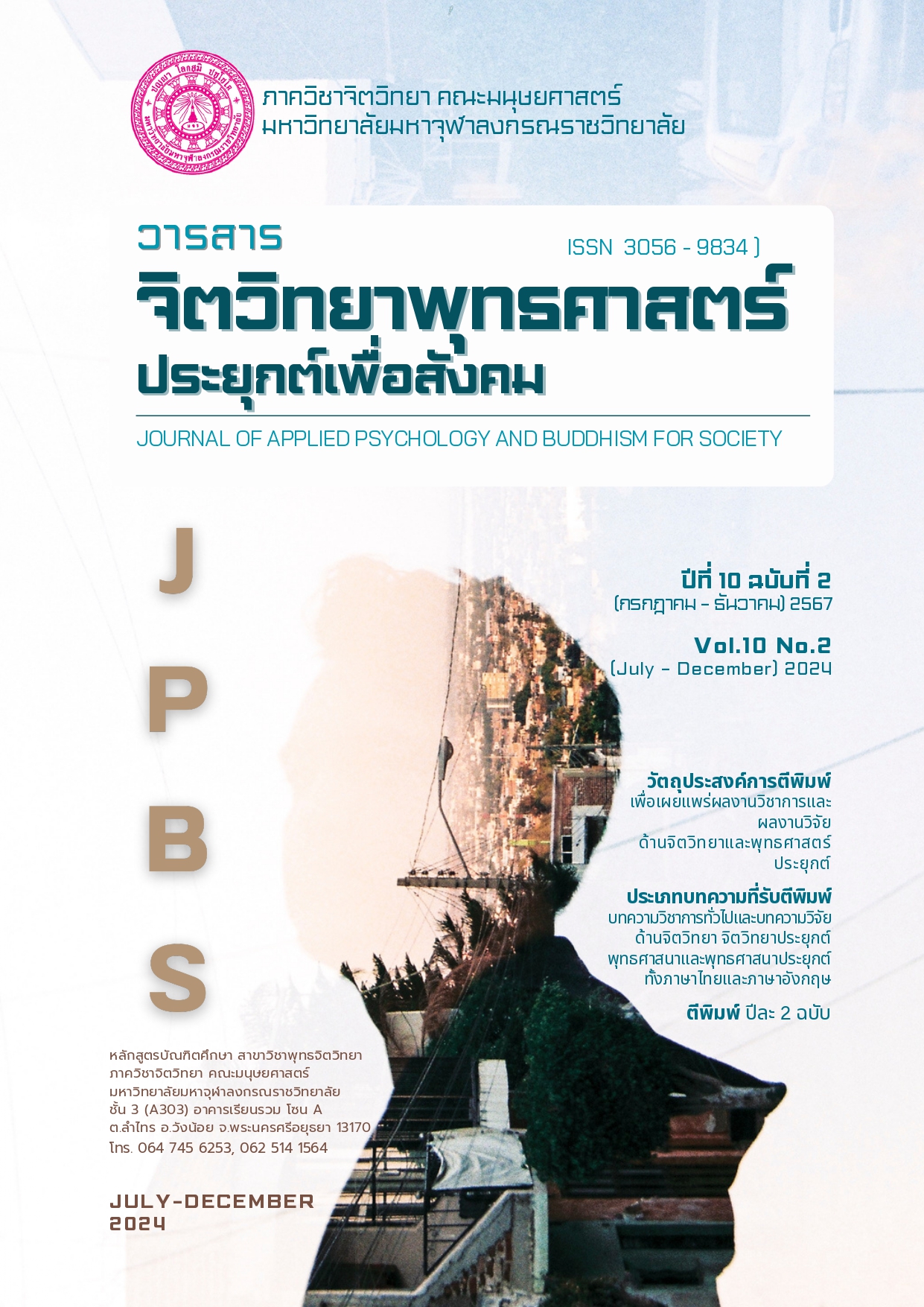Buddhist Psychology Innovation to Uplift the Mental Well-being of Community Workers (VHVs)
Keywords:
Spirits Uplift, Buddhist Psychology, Village Health Volunteers (VHV), Training KitAbstract
The purpose of this research is: 1. to study the emotional elevation of community workers (village health volunteers, VHVs), 2. to develop a training program based on Buddhist psychology innovations for the emotional elevation of community workers (VHVs), and 3. to present the results of developing Buddhist psychology innovations for the emotional elevation of community workers (VHVs). The research used a mixed-methods design, incorporating both quantitative and qualitative methods. The research tools included: 1) a training program with a content validity index ranging from 0.56 to 1.00, and 2) a measurement tool with a reliability of 0.95. The sample consisted of two groups: Group 1 comprised 400 community workers (VHVs) with more than 2 years of experience, and Group 2 consisted of 60 participants in the experimental group, determined through G Power analysis (effect size = 0.8, alpha = 0.05), with the control and experimental groups each consisting of 30 participants. Participants were selected through individual matching and simple random sampling. The experimental group received training through a Buddhist psychology innovation program, while the control group did not receive any training.
The research results revealed that: 1. the VHVs showed an overall level of emotional elevation in the normal range, with high levels of mental strength and Buddhist spiritual development; 2. the training program was developed by integrating concepts such as mental strength, spiritual intelligence from a Buddhist perspective, mindfulness, loving-kindness meditation, Yoniso manasikara (wise attention), and experiential learning. The program consisted of four steps: problem recognition, reflective thinking, creating new knowledge, and practical application; 3. the experimental group showed significantly higher emotional elevation post-test and follow-up compared to pre-test, at the 0.05 level; and 4. focus group discussions revealed that the experimental group was satisfied with the training program as it helped them gain better self-awareness and understanding of others, providing guidance on working effectively within the community to achieve emotional elevation.
References
กรมสุขภาพจิต. (2024). ความสุขของคนไทยในช่วงการระบาดของไวรัสโควิด-19. สืบค้น 23 ตุลาคม 2567, จาก https://kku.world/0az1m
กรมสุขภาพจิต กระทรวงสาธารณสุข. (2024). การส่งเสริมสุขภาพจิตชุมขน : กิจกรรมและแนวทางการป้องกัน. วารสารสุขภาพจิตชุมชน, 22(1), 23-32.
จิรังกูร ณัฐรังสี และคณะ. (2023). สุขภาวะทางใจของอาสมัครสาธารณสุขประจำหมู่บ้านในระหว่างการแพร่ระบาดของโรคติดเชื้อไวรัสโคโรนา 2019. วารสารสุขภาพและการศึกษาพยาบาล, 29(2), 1-13.
ชนาธิป บุษราคัม, ประสาร มาลากุล ณ อยุธยา และ ผ่องพรรณ เกิดพิทักษ์. (2018). การพัฒนารูปแบบการเรียนรู้เชิงจิตวิทยาบูรณาการเพื่อเสริมสร้างสมรรถนะทางวัฒนธรรมองค์กรของผู้บริหารระดับต้นบริษัท บี อาร์เอฟ (ไทยแลนด์) จำกัด. วารสารวิชาการศึกษาศาสตร์, 19(1), 16-30.
ธัชธา ทวยจด และคณะ. (2022). ความรู้ เจตคติ และพฤติกรรมการป้องกันและควบคุมโรคโควิด-19 ของอาสาสมัครสาธารณสุขประจำหมู่บ้าน (อสม.) จังหวัดจันทบุรี. วารสารสาธารณสุข มหาวิทยาลัยบูรพา, 17(2), 42-55.
ภัทรพร เตชทวีฤทธิ์ และคณะ. (2019). ความฉลาดทางจิตวิญญาณในบริบทคนไทย. วารสารพฤติกรรมศาสตร์, 25(2), 79-97.
ภาคภูมิ ธีรสันติกุล และ เกษม ละหีม. (2022). การพัฒนาการตระหนักรู้ตนเองของนักศึกษา. วารสารดุษฎีบัณฑิตทางสังคมศาสตร์, 12(3), 558-600.
Bandura, A. (1986). Social foundations thought and action: A social cognitive theory. Prentice Hall.
Costa, A. L., & Kallick, B. (2004). Assessment strategies for self-directed learning. Thousand Oaks, CA: Corwin.
Grotberg, E. H. (1995). A guide to promoting resilience in children : Strengthening the human sprit. The Hague, Netherland : Bernard Van Leer Foundation.
Kocaman, G., Dicle, A., & Ugur, A. (2009). A longitudinal analysis of the self-directed learning readiness level of nursing students enrolled in a problem-based curriculum. Journal of Nursing Education, 48(5): 286-290.
Knowles, M. S. (1975). Self-directed learning: A guideline for learners and teacher. Chicago, IL: Follet.
Lee, J.H. & Patel R.H. (2024). The Role of Resillience and Spiritual Intelligence in Social Work Volunteers. Journal of Social Service and Health, 23(3), 93-107.
Robitschek, C., Ashton, M. W., Spering, C. C., Geiger, N., Byers, D., Schotts, G. C., & Thoen, M. A. (2012). Development and psychometric evaluation of the Personal Growth Initiative Scale–II”. Journal of Counseling Psychology, 59(2), 274-287.
Robitschek, C., & Cook, S. W. (1999). The influence of personal growth initiative and coping styles on career exploration and vocational identity. Journal of Vocational Behavior, 54(1), 127-141.
Zohar, Danah;& Marshall, Ian. (2002). SQ: Connecting with our spiritual intelligence. New York. Bloomsbury.
Downloads
Published
How to Cite
Issue
Section
Categories
License
Copyright (c) 2024 Journal of Applied Psychology and Buddhism for Society

This work is licensed under a Creative Commons Attribution-NonCommercial-NoDerivatives 4.0 International License.






